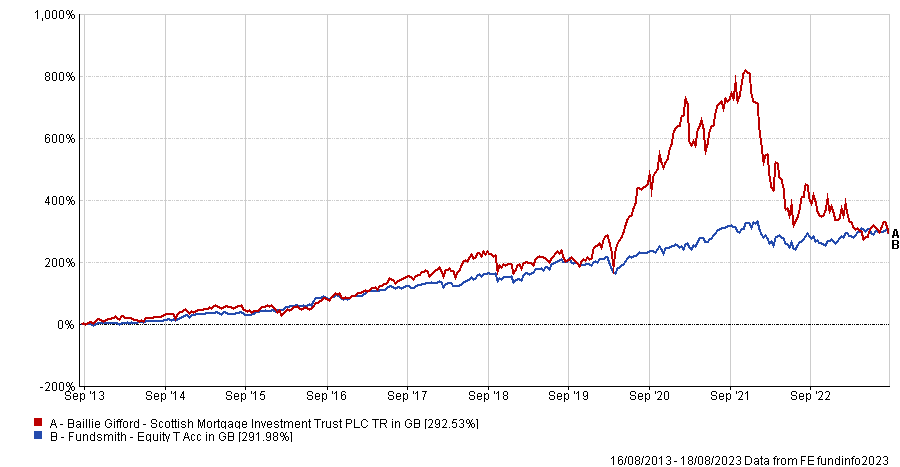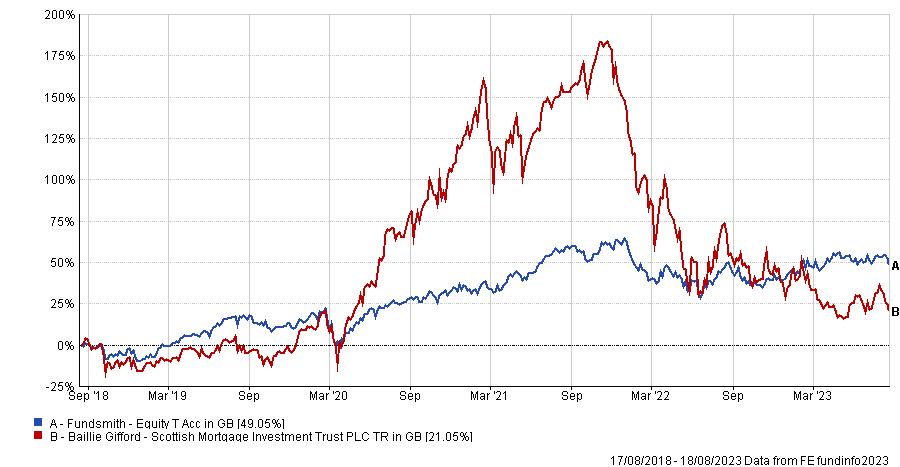Two of the biggest names in the investment industry – open-ended fund Fundsmith Equity and investment trust Scottish Mortgage – have both been spectacular long-term performers for investors.
The former invests with a buy-and-hold approach, with manager FE fundinfo Alpha Manager Terry Smith picking high quality stocks that have enviable brand recognition, pricing power and a history of strong returns.
Scottish Mortgage, headed by Alpha Manager Tom Slater, is more speculative, investing in high growth stocks that are both listed on the stock market as well as those in the private equity space.
Both have made top-quartile returns in their respective global sectors over 10 years, with the trust pipping the fund over the decade, with a return of 292.5% versus 292%.
Performance of fund vs trust over 10yrs

Source: FE Analytics
However, despite rocketing in 2020, the performance has reversed over the past five years, with the fund now significantly ahead of the trust (49% versus 21%).
Scottish Mortgage has had a disastrous run in the past 18 months, with higher interest rates affecting its high-growth names that tend to be valued for future growth.
From its high point in 2021, the trust has lost 57% and its shares now stand on a discount to the net asset value (NAV) of the underlying holdings of around 20%.
Performance of fund vs trust over 5yrs

Source: FE Analytics
Fundsmith Equity leads in other categories as well over the past five years. It has a lower volatility (13.2% versus 26.9%), as well as a better maximum drawdown – the most an investor could have lost if buying and selling at the worst time – and Sharpe ratio, which measures risk-adjusted returns.
It has spent more months in positive territory than the investment trust and had fewer loss-making months, although Scottish Mortgage has made a higher maximum gain – the most an investor could have made if buying and selling at the best time – and has a better alpha score, which is a measure of a fund’s over- or under-performance by comparison to its benchmark.
Given the choice, Tom Sparke, investment manager at GDIM, said he would prefer to back the undervalued investment trust than the behemoth open-ended fund.
“Scottish Mortgage Investment Trust and Fundsmith Equity have been two of the most iconic investment vehicles this century and both have rewarded investors with fantastic returns. After such an extended period of outperformance from both, they are tempting options for investors,” he said.
He noted that the discount on Scottish Mortgage – something that does not apply to Fundsmith Equity – could be a “potential benefit” in the long run for investors buying now.
“There may be latent value there, whereas Fundsmith is valued at the market price of its total holdings. Overall, the discount on Scottish Mortgage and the potential of its top holdings would lead me to plump for that investment at this time,” he said.
Rob Morgan, chief analyst at Charles Stanley Direct, agreed, but said investors should be cognisant of what they are investing in with the investment trust.
“Scottish Mortgage [would be my pick] but at the periphery of a portfolio rather than the core. There are plenty of alternatives to Fundsmith, but the mix of public and private growth capital opportunities in Scottish Mortgage is unique and all for a very attractive all-in cost,” he said.
Laith Khalaf, head of investment analysis at AJ Bell, noted however that both funds provide different things and will not be applicable to the same investors.
“While both Fundsmith Equity and Scottish Mortgage share a long-term investment horizon, I see them as fundamentally different offerings,” he said.
“Fundsmith invests in established companies with strong revenues streams and balance sheets, whereas Scottish Mortgage looks for companies which its managers think can dominate their industries in the future, even if they have little or nothing to show by way of earnings in the here and now.”
This, combined with its propensity to invest in unlisted companies, makes Scottish Mortgage a “riskier proposition”, which is reflected in its volatility over the past few years.
“It’s possible to hold both these funds in a portfolio but Fundsmith Equity would be a core global equity investment, and so would naturally come first in the pecking order when selecting funds,” said Khalaf.
“Scottish Mortgage would be a high-octane, high-risk addition for very adventurous investors who already have well-diversified portfolios.”





